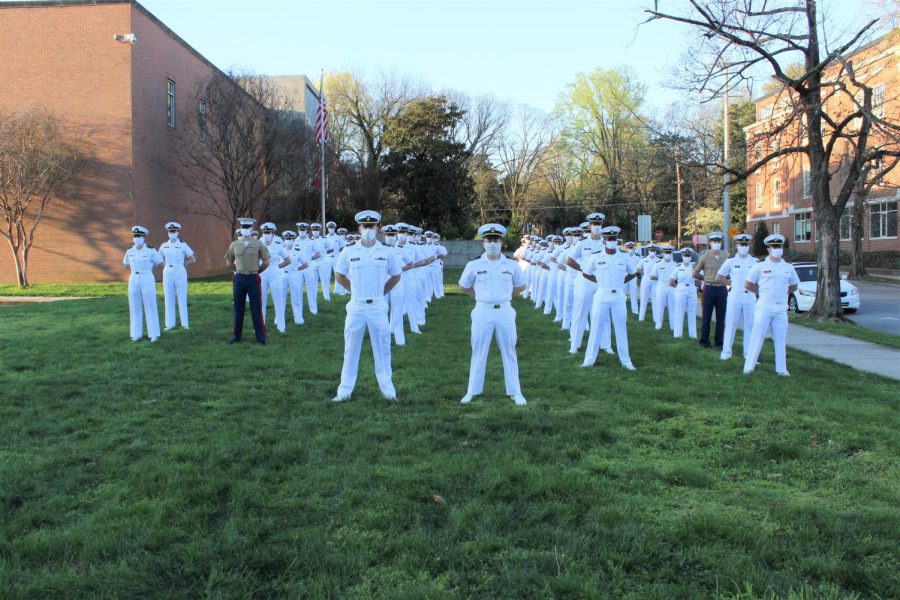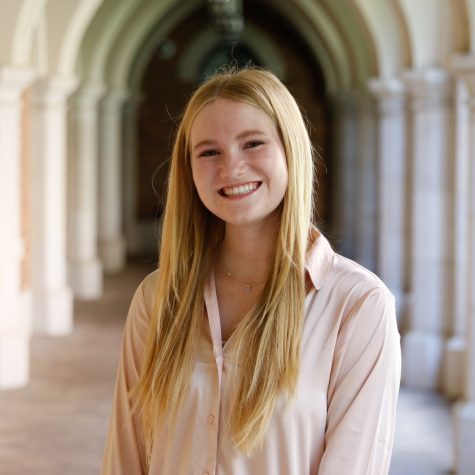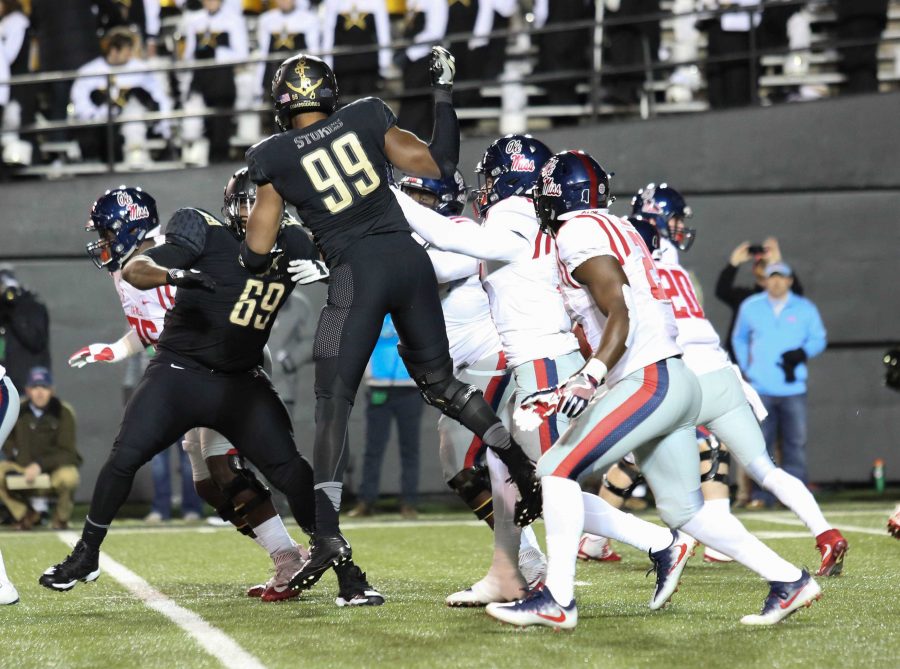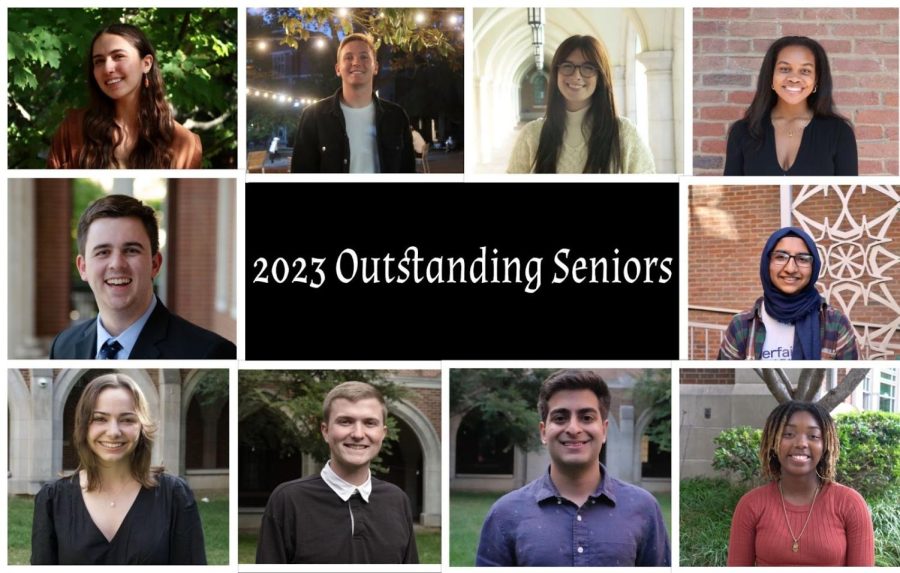To many students, the ROTC program is a mystery. Aside from seeing ROTC students walk around campus in uniform or hearing about early morning physical training (PT), many students’ knowledge of the entire ROTC experience is limited. The Hustler sat down with two members of the Navy ROTC program, senior Jack Pantlin and sophomore Will Brady, to get the scoop on the program at Vanderbilt. After learning more about Navy ROTC, if you’re interested in learning more about the daily life of Army ROTC students, check out this article.
The Vanderbilt Navy ROTC program was founded in 1945, around the core tenets of Honor, Courage, and Commitment. The program currently consists of 69 midshipmen, all of whom will eventually commission into the Navy and Marine Corps. Throughout the year, they host important events including the Army-Navy Football Game, Navy and Marine Corps Birthday Ball and Change of Command Ceremony. Now on to the Q&A:
The Hustler: What is your basic schedule, from the time you wake up to the time you go to sleep?
Pantlin: Once or twice a week in the morning, we have a workout at 5:45 a.m. We’re going to do something where we’re running, doing calisthenics or something collaborative. From there, a lot of it is on your own, just like a normal college student, where you’re trying to manage your time, go to classes and study.
Every week, we have a leadership lab on Thursdays, where the whole group comes together again and we’ll hear from different speakers, cover different military topics and get mentorship from officers who are in charge of our unit. We have one class every semester, every Tuesday and Thursday at our ROTC building. The class can be a whole wide range of different topics.
Brady: I’m a marine option, and Pantlin is a navy option. So we’ll have a little bit different schedules. I’ll do something called “Bulldog,” which is one PT a week that’s specific for the marines, and then we’ll do the Battalion, with navy and marine combined.
What motivated you to join ROTC?
Brady: For me personally, I have two older brothers who both played sports in college, and I wanted something similar in structure. I’d always thought about the military and thought that it would be a good way to discipline myself and become the man I want to be—someone with service involved in their life. I’d always seen it in that light and I heard about the scholarship, so it would be giving me the structure of an athlete, to an extent, and a scholarship, which would be a great combo.
Pantlin: I always had some sort of desire to serve in the military. My grandfather served in the Navy and so he’d always been a big influence on me, and I had a cousin who’s in the army who was a real role model. In high school, I played a lot of sports and high school was pretty heavily academic. I think making that transition where I’d still be able to compete and have growth opportunities and leadership opportunities and then fulfill the career I’d wanted was the perfect mix. You get to do all of that and have the life of a normal college student and be on a normal campus as opposed to going to a service academy or doing something along those lines.
What’s the hardest part about being an ROTC student?
Brady: Personally, I would say scheduling and balancing things out. When you throw in one or two days a week where you wake up at 5 a.m., it’s gonna throw off your sleep schedule. Now, I take 8 a.m. classes every day of the week so that I don’t get off of that schedule. But also part of it is balancing ROTC stuff with being a student. As you go further up in ROTC and as you get older, you start taking on responsibilities. For me, I’m the public affairs officer, the PAO. I take pictures and I run the social media accounts for ROTC. It’s similar to a club responsibility but it feels more important. It’s a lot more of a responsibility with consequences.
What’s the best part about being an ROTC student?
Brady: Job security. It’s knowing that you’re going to have something to do every summer, like a training evolution and a set in stone job after college. It’s really nice and opens up your ability to explore in college, like with the classes you take, since you know where you’re headed. With that endpoint in mind, it frees up exploration in other facets.
Pantlin: For me, I would say being around people who share the same goal or purpose as you. I think doing it at a school like Vanderbilt where it is a real challenge means that everyone is pretty heavily invested in it. To have that team spirit and collaborative group around you the whole time is something that I really enjoy about it.
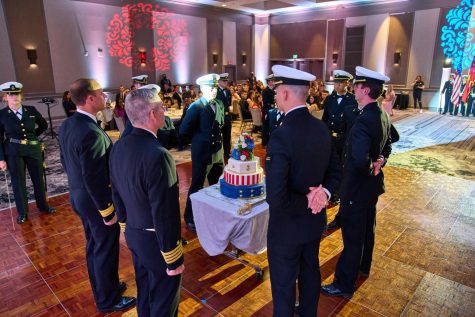
(Navy ROTC)
What have you gotten out of ROTC/gained from it?
Pantlin: It’s built on skills that I’d started to develop, like having self-discipline and being able to manage your time well. But I would say that the biggest one you gain directly from it is getting a growth mindset; you’re definitely going to fail at different points and there’s going to be a lot that’s asked of you, so you really have to have a mentality of “I’m going to be willing to step out of my comfort zone, I’m going to take on things I haven’t done before and I’m going to try to be somebody who’s a constant learner and has to keep improving themselves.”
Brady: I would definitely echo everything Pantlin said, and I’d also say that you gain a combination of discipline and adaptability. You’re sometimes thrown into roles in the military or in ROTC and you have to adapt and get it done. You’re used to that sort of rigmarole and discipline is waking up every morning because everyone else is out there and you gotta join them.
What word would you use to describe ROTC students?
Pantlin: One that comes to mind is enthusiastic. I think most people, whatever they’re doing, are pretty serious about it or devoted to it.
Brady: I was gonna say motivated, which is sort of in the same vein. They have a clear goal—we’re all going to end up in the same spot and we’re trying to get there.
Are there any misconceptions about ROTC or things you wished people outside of the program knew?
Brady: One quick thing would be that if you’re in it, it’s not the same thing as JROTC, where it’s an optional thing. Once you have the scholarship and you’re past your freshman year, you’re contracted to serve four years after school. You have to pay back that debt to an extent and that’s something that some people don’t understand. And some people would say “Why would you do it if you can go into the military without going to college?” That would be that there’s two different routes—one that’s enlisted and one that’s officer. You have to have a college degree to become an officer and so that’s why we’re doing this whole bit.
Pantlin: Most people who are involved in it, it’s not the only thing that they’re doing. People in ROTC that I know do a pretty wide range of things. We have a lot of people in Greek life and we have people who do different club sports and other different organizations on campus. A lot of people are really multifaceted and widely involved across campus outside of just the military setting.
Anything else?
Pantlin: One thing we want to do is have a presence on campus, where people know what the military’s all about and can understand the why and how of what we’re doing. If anyone was ever thinking about the military or felt that it might be something that they want to do, that it’s been a really fulfilling experience and I think it’s something that people can really benefit from.
Brady: I would say that the more that I do it, the more appreciative of it I become, the more I enjoy it. If you do have any desire to do it, it’s worth looking into. You can be a college programmer and that’s where you start doing stuff with us and then apply for a scholarship for two years, three years, whatever it may be and get involved.
Responses have been edited for clarity and length.











